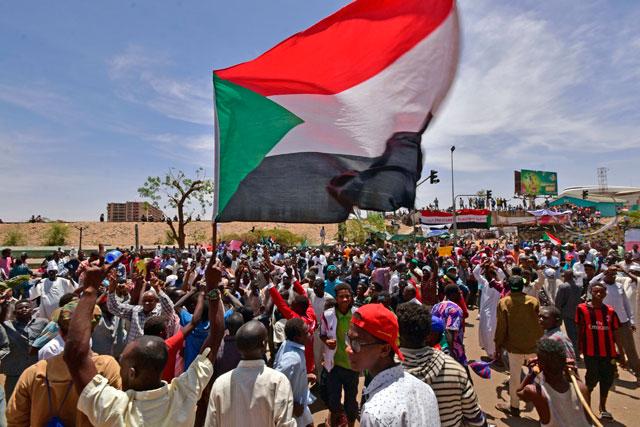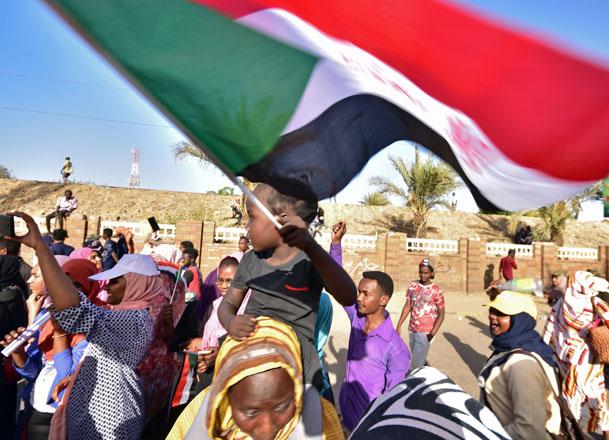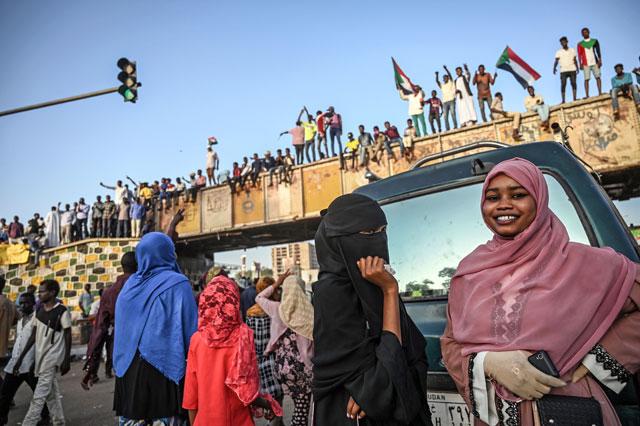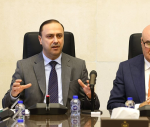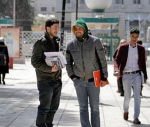You are here
Sudan's army ruler vows to hand 'power to the people'
By AFP - Apr 21,2019 - Last updated at Apr 21,2019
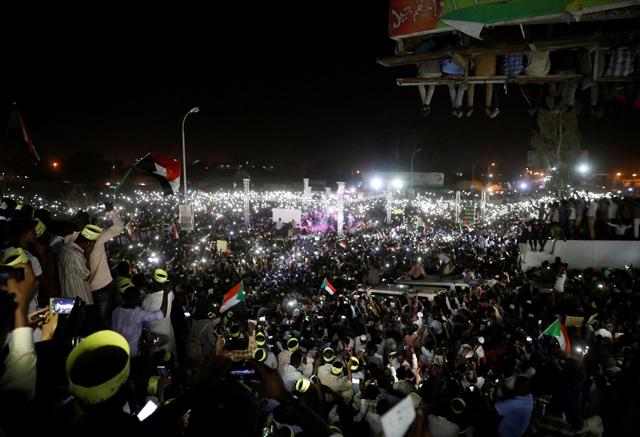
Thousands of Sudanese gather for a mass anti-government protest in front of the Defence Ministry in Khartoum, Sudan, on Sunday (Reuters photo)
KHARTOUM — Sudan's military leader vowed Sunday he was committed to handing power to the people, as a sea of protesters outside army headquarters awaited the unveiling of a rival civilian council.
New army ruler General Abdel Fattah Al Burhan also pledged to respond to demonstrators' demands within a week and confirmed that cash worth over $113 million had been seized from deposed president Omar Al Bashir's residence.
Protesters on Sunday waved national flags and held their mobile phones aloft as night fell, the torches on their devices once more creating a sea of light outside the army headquarters, where they have been encamped since before Bashir's April 11 downfall.
Clapping and waving Sudanese flags, the crowd waited for their leaders to announce a civilian council that they want to take power from the military rulers as loudspeakers played nationalist and revolutionary songs.
"High! High! Sudan is up high," huge crowds of protesters chanted.
"Our revolution is civilian and protected by the people," they vowed.
They also chanted "freedom" and "Whether it [the regime] falls or not, we are staying", as they again pledged to keep up the pressure on the country's new military council.
Burhan said a team of police, army and security agents found a cash haul including seven million euros ($7.8 million), $350,000 and five billion Sudanese pounds ($105 million) during a search at Bashir's home.
Saudi Arabia and the United Arab Emirates, meanwhile, offered $3 billion (2.7 billion euros) on Sunday in financial aid to the cash-starved country.
The northeast African nation is one of the world's most impoverished countries and faces an acute foreign currency shortage — a key factor which helped trigger nationwide protests against Bashir.
‘Power to the people’
A military council has been put in place for a planned two-year transition period, but despite talks with protesters the two sides have struggled to agree on the shape and form of a civilian leadership.
“The council is committed to give power to [the] people,” Burhan insisted, in his first interview on state television since taking power.
He also said that a delegation would travel to Washington soon to seek Sudan’s removal from the US list of state sponsors of terrorism.
The Sudanese Professionals Association (SPA), at the forefront of the protests, has defiantly said it will unveil its own civilian council later on Sunday.
“We are waiting for the announcement today,” Romaysaa Omar, one of the protesters at the sit-in area, told AFP.
“All Sudanese people are in favour of the council to be announced by the SPA.”
On Saturday, protest leaders and the military rulers held talks about a power handover and agreed to continue discussions.
“We clarified our main demand, which is the transfer of power to civilian authorities,” Siddiq Yousef, a senior member of the Alliance for Freedom and Change, the umbrella group leading the protest movement, told state television after Saturday’s talks.
“We agreed to continue negotiations to reach a solution that satisfies both the sides, so that the transfer of power will happen in a peaceful way.”
After Bashir was ousted by the army, the military rulers resisted calls to transfer power to a civilian body.
“What we want from them is a timetable to hand over power, so things don’t drag on,” said Ahmed Al Rabia, a leader of the umbrella group of unions for doctors, engineers and teachers.
He said mounting pressure from the street and from the international community was expected to make the military council cede power in “two to three weeks”.
‘End military rule’
Protest leaders say the civilian council would form a transitional government to rule Sudan for a four-year term, followed by elections.
“All we hope for is to be ruled by civilians and get rid of the military rule,” said protester Ehsan Abdallah.
On Sunday Riyadh and Abu Dhabi pledged to inject $500 million into the Sudanese central bank and $2.5 billion to help provide food, medicine and petroleum products, the official Saudi Press Agency said without specifying if the money is a gift or a loan.
The Sudanese pound surged on the black market on Sunday, trading at 45 to the dollar against 72 last week.
The military council has made some concessions to the protesters by agreeing to demands such as detaining Bashir and releasing many political prisoners and demonstrators.
Prominent Sudanese journalist Khalid Tijani said the protest leaders were in a “tough situation” over finalising the civilian council.
“If they are not ready with the names, it will send a negative signal, and this will not be to the benefit of the revolution,” said Tijani, editor of economic weekly Elaff.
Related Articles
KHARTOUM — Sudanese protesters demanded new military rulers set up a civilian government as the foreign ministry called Sunday for backing f
KHARTOUM — Sudan's second new military leader in as many days vowed Saturday to “uproot” deposed president Omar Al Bashir's regime and relea
KHARTOUM — Sudanese protesters on Tuesday called for a mass rally, insisting the army is not serious about handing power to civilians nearly


